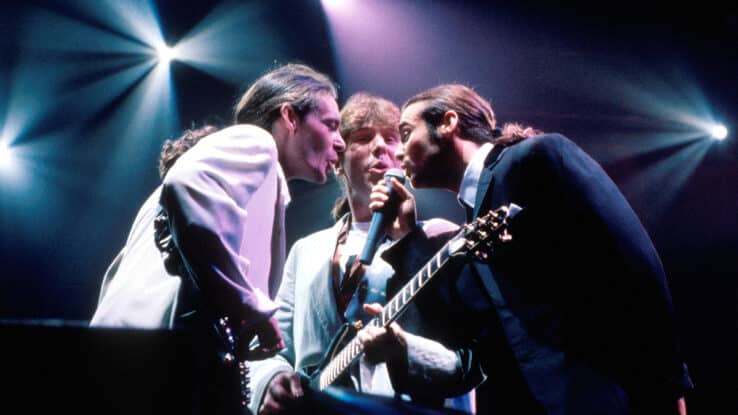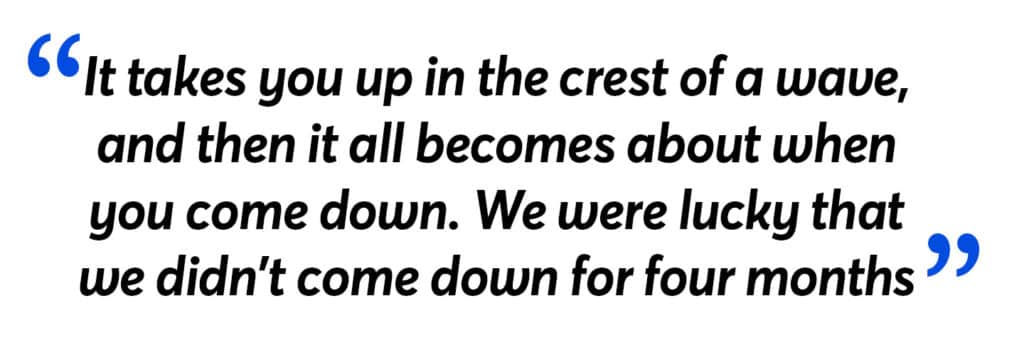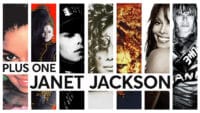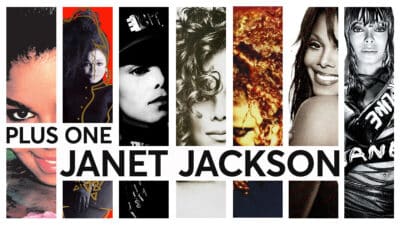Interview

Showstoppers
Wet Wet Wet’s Graeme Clark on the story behind ‘Love Is All Around’
Three decades after taking the charts by storm, the Scottish bass player looks back on the cover version that changed his life
It’s 30 years since Wet Wet Wet released ‘Love Is All Around’, which is roughly how long it seemed like it spent at the top of the UK charts. The cover version of The Troggs’ 1967 single was recorded for the soundtrack of Richard Curtis’ seminal rom-com Four Weddings And A Funeral, and went on to spend an incredible 15 consecutive weeks at No.1. An accolade that is still yet to be bettered by another UK artist, it was a song you simply couldn’t ignore nor avoid. You could feel in your fingers, you could feel it in your toes, and you could feel it going round and round and round in your head for all of 1994.
When a track enters pop culture in this way, and reaches such a striking level of popularity, you can’t help but wonder how the band still feel about it, to figure out just how much it means to them and how it impacted their lives. For Graeme Clark, bass player and founding member of the Scottish outfit led by frontman Marti Pellow, it’s a song that he holds a great reverence for. “I’m really proud of it, because it’s not the f*cking ‘Birdie Song’, do you know what I mean?”
The chipper and congenial Clark, who is still a member of the band, and still tours to this day – now with former Liberty X star Kevin Simm on lead vocal duties – looks back on the origins of this record with a real affection, and through a nostalgic lens.
“We wanted to do a James Bond theme,” he says. “They couldn’t get us that, but they could get us a British movie called Four Weddings And A Funeral, written by Richard Curtis. But we were like, it’s a comedy? Not to mention a strange name for a movie…”
From there, Curtis sent a small list of songs over to the band, allowing them to pick whichever one they wanted cover. “We had the option of three songs, one was Gloria Gaynor’s ‘I Will Survive’. One was Barry Manilow’s ‘Can’t Smile Without You’, and the other was this Troggs song,” he continued. “Gloria Gaynor was self-explanatory; we weren’t going to touch that. If we did a Barry Manilow song there would be too much cheese involved, do you know what I mean? Barry is an amazing writer, but it would just tip the scales too much. So, we came to the Troggs.”
The lesser-known track of the three songs, ‘Love Is All Around’ gave Wet Wet Wet more licence to inject their own distinctive style into the record. They managed this right off the bat, with a completely different musical arrangement in their intro. For Clark, he felt the band’s lack of history with the record worked greatly in their favour.
“I’d never heard the song,” he smiled. “We have a saying when we go into the studio, ‘leave your brain at the door’. Try not to overthink things. Because you over-complicate it. The fact we had no history was a very important part of it. It came together really quickly and we weren’t thinking about it, we really weren’t. That’s why it was hugely successful.”
Though proud of the song and the band’s version of the record, Clark admits they didn’t foresee quite how much of an impact the track would have. “We were listening back to it thinking, it sounds alright, that’ll make a great B-side, or an extra track in one of our new singles or something, there was no conversation around where it would go.”

It took the reactions of others within the industry for Clark and the other members of the band to realise that they were potentially sitting on something big. Something that could make waves in the British charts.
“I was beginning to see that this was a bigger song than I thought it was, because lots of people knew the original,” he says. “When we were doing Top Of The Pops, Alice Cooper was there. We finished the dress rehearsal, when there’s no crowd there, and I was sitting about checking the other acts out, and he came over and said, ‘that’s a fantastic version of that song’.”
It wasn’t just Alice Cooper – Clark even got praise from the unlikeliest of places: his father-in-law. “He’s a classic kinda guy, and I’m the wee ducky in a pop band suddenly on his radio. He said, ‘I didn’t expect that from you’, and that’s as far as his compliment went,” Clark laughs.
“But people were talking, so I knew something was afoot. Not that I could ever have imagined it would grow into what it grew into, but I could tell that this song almost had a life of its own.”
That it did. ‘Love Is All Around’ dominated the charts, riding the wave of being attached to an equally as popular movie – and went on to define the spring and summer of 1994. Clark however, was just pleased it went to No.1 at all.
“Bands needed big, massive hits. We were always one record away from being dropped, so we needed to sell records; we needed to be seen to be successful because the minute you’re not is the minute the record company say it’s over for you,” he says. “Pop music was extremely disposable, so having a No.1… in the back of my mind I’m thinking – well that’s the next two years taken care of, we can dine out on that.
“It takes you up in the crest of a wave, and then it all becomes about when you come down. And we were lucky that we didn’t come down for four months. We joke about that – we don’t talk about it in weeks, we talk about it in months. We were No.1 for four months, man.”

Clark believes he had a great vantage point when it came to the ongoing success of the record, not being in quite the same limelight as fellow bandmember Pellow.
“It was like watching another band and another record. I’m the bass player, and the bass player’s profile is tiny, but Marti did get a lot – he was the face of the band and he was instantly recognisable, so it catapulted him up, he got the fame. I could remember walking around thinking, I’m eight weeks at No.1 in the charts, and nobody was batting an eyelid. Looking back at it now, I feel pretty privileged that I was on the success bus driving down the road, but my life didn’t become unmanageable in any way.”
The success grew, the weeks went by, and the band kept having newfound moments that indicated this track was on a different level to anything that Wet Wet Wet had put out before.
“When the record company throws parties for you, and everyone is there, even the CEO, that’s when we knew that this was a different record, on a different level. It was worldwide.”
Well, other than one rather important place: America. “Nile Rodgers once said to me, if you have a hit in America, usually you have a hit all over the world. With this record, we had a hit all over the world apart from America,” says Clark.
“But listen, I’m not fussy. I’m happy with what we got and where we took this wee garage band that we had when we left school. It’s incredible really that we’re still talking about it, and I am happy to do so, because I’m proud of it. Some would say ‘we’ve got the albatross of the big hit’, but embrace your albatross man, because you’re lucky to have to it.”
Eventually, the wave broke. ‘Love Is All Around’ reached such a high volume of popularity that it naturally led to something of a minor backlash – which was probably inevitable after that time spent at the top of the charts.
“At the time it was fairly intense, it was getting played everywhere. It was omnipresent. It was very ubiquitous around the mid-90s,” Clark says. “But while it was positive for us, there was some negativity. This one guy was breaking into jukeboxes in pubs and taking out the record saying ‘if I hear this f*cking record one more time…’ and then he’d smash it.”
By the end of the summer, the band took the decision to just let the song play out, to not press any further copies, just waiting for the stock to sell.
“We just let the run go,” he says. “They’d made a bunch of records and CDs in the 15th week and we said, that’s it, don’t press anymore, just let it run out, let it go. Plus, the fact Whigfield’s ‘Saturday Night’ was a big Ibiza tune that suddenly caught the imagination. It was coming to the end of the summer. ‘Love Is All Around’ was coming to the end of its life.”
“I think it caused intensity in other people’s lives more than it did in mine,” adds Clark, now looking back through 30 years, through the Love Actually Christmas comedy re-cover, and ahead of a major 2025 UK tour that’ll surely see ‘Love Is All Around’ steal every encore. “As a musician, you want as many people in the world to hear it as possible, and you can’t complain when lots of people f*cking like it, man. This is why we were in a band!”
“I always felt that could happen to us if we had the right record and the stars aligned, and it just so happened that ‘Love Is All Around’ was that star-aligning record that comes along, maybe once in a band’s career, if you’re lucky. So yeah, I am thankful for it.”
Now the dust has settled, and now Clark has the benefit of hindsight, does he have any idea why this cover version was as successful as it was?
“It’s the simplicity,” he says, smiling. “Because let’s face it, music is a complex thing, no matter how you look at it. So, if you can make it sound simple, people warm to it. It’s got crashing guitars in there, but it’s got this mellifluous and melodic structure to it. Simplicity of the vocals, simplicity of the lyrics: I feel it in my fingers, I feel it in my toes…”
Photo by Michael Putland/Getty Images









